Kate Bowler: We’re given a story of birds and bees where two people fall in love and out of their love blooms a perfect little creature. But I know too many people for whom every step of that is not a fairy tale. Finding a partner, keeping a partner. Fertility treatments. Miscarriages. Perhaps family is bigger, wider than we’ve been told. It is a story of belonging and loss and courageous love. And perhaps it involves learning to love a stranger. Sarah Sentilles is a writer, teacher and scholar of religions. You know, my very favorite kind of person. She earned a bachelor’s degree at Yale and Master’s and doctoral degrees at Harvard. She is the co-founder of the Alliance of Idaho, which works to protect the human rights of immigrants. And she is the author of a stunning and haunting memoir called Stranger Care: A Memoir of Loving What Isn’t Ours. Sarah, it is a joy to finally be talking with you today.
Sarah Sentilles: Thank you so much, Kate. I’m thrilled to be here. Your introduction just give me goosebumps, it was so generous. Thank you. So beautiful.
Kate Bowler: You and your husband, Eric, had pretty fundamental existential disagreements when it came to deciding to be a parent. What was at odds or complimentary about your views?
Sarah Sentilles: Well, I think I’d always I’m a feminist. I think of myself as a feminist. I think of myself as a strong person who does what she wants and navigates the world with power and courage. But when it came to motherhood, I really couldn’t admit to myself that it was my deepest longing. It took me a long time to say out loud, I want to be a mother, I want to have a baby. And when I finally did admit that to my partner, I discovered I was married to an environmentalist who didn’t want to bring another human onto the planet. He thought that there were already, you know, there’s five hundred thousand children in foster care in the United States, and there’s a hundred thousand of those who need permanent homes, somewhere to live. And he thought, why do we need to make a new child when there’s so many children in the world who need a safe place to be? We can be one, we can be that safe place. And so it took it took me a long time to get to where he was, and I got there for different reasons. You know, I went to therapy to talk about it. And the question that was running through my mind is, Do I want to have a baby? Do I want to have a baby? Do I want to have a baby? And someday that switched to do I want to be a parent? And I realized that I didn’t need to be pregnant. I didn’t need to have some part of my DNA out in the world. And so foster care became our our common ground. We did it for different reasons. He did it because he wants to live in a world where we tend the Earth. And I did it because I want to live in a world where we tend one another. So it became this, this shared place where we could navigate the different ways we understand the world and the different roles we think humans play in making the world the way it is.
Kate Bowler: Sometimes I like to think about the sort of prevailing myths we have accidental or on purpose as being different kinds of prosperity gospels, like things that will just somehow make more, but usually because we are good, because we we did it in the right way or we had the. I’m a big fan of like, but I had the right intentions. I have a lot of great intentions, but the DMV does not care, does not care about my intentions. I talked to a lot of parents who are trying to manage the heartbreak of the stories of that they have of parenthood. It just kind of made me wonder, is there like, is there a foster parent prosperity gospel?
Sarah Sentilles: Wow, I love your mind. I think the version of I think the version of that is like the sacrificial story of the foster parent who should never want to keep what isn’t theirs and should always be going for a reunification and has no limits. Not necessarily no limits on love. I feel like there’s a way that the expectation is that you will temper your attachment and your love to the children that you bring into your home knowing that they will leave. But there’s this myth of the self-sacrificing, selfless. I’ve had a hundred and fifty foster kids and how beautiful. I mean, we need people who will do that. The myth is that kind of keep doing it, keep doing it, keep doing it, it’s not about you, it’s not about you, it’s not about you. Your heartbreak doesn’t matter. Your heartbreak doesn’t matter. Your heartbreak doesn’t matter. And there’s something really beautiful about that and something really dangerous as well.
Kate Bowler: Yes. Yeah, that you can. You give so freely you never need to take. You never need to keep.
Sarah Sentilles: They advise you to keep a list of your of your limits by the phone because you get a call and you have about three to five minutes to say yes or no. I mean, it’s not. It’s very fast. They call and they say there’s a child who’s been taken into care. We know x y z, can you welcome him? Can you welcome her? Or we have a sibling set? That’s the language for siblings, for brothers and sisters. We know x y z. Can you welcome them?
Kate Bowler: The way you think about limits like, are you as a foster parent allowed to have limits? Sounds like it was almost concretized, almost right away. There’s this home study process that’s very invasive, and it asks people to answer some very difficult questions. Like it’s like a long list of qualities that the social worker asked if you and your husband would be willing to accept into your home. But like, like schizophrenia or cruelty to animals, it seems like it would be so hard to imagine how limitless you need to be. Like, what is the what is the math on that when you know everything in our. I don’t know everything in the way that we we think about whether something is worth doing which like that’s the language we would use as we like, we try to figure out what value it would have to us. But but they’re asking you almost right away, like how much can you handle? Like, let’s let’s set a number.
Sarah Sentilles: Mm hmm. And and never having experienced those things how can you know. You know, it’s interesting now to look back, and some of the things that we were very afraid of were things that we said yes to when we welcomed home this three day old baby girl. But we had no idea. And it wasn’t anything to be afraid of, actually, the things that we would have set limits had we known had been known more about, about this child, had we know more about her background, we probably would have said no. But but we didn’t say no because we didn’t know that information, so we said yes and the things that we were afraid of, we didn’t need to be afraid of.
Kate Bowler: When you when you did get that phone call for a three day old little baby named Coco and they put her delicate five pound little frame in your arms, you felt the rightness of it, you felt such an instant love. What an incredible thing to feel magic with a stranger.
Sarah Sentilles: It was immediate. I think one of the things I had underestimated about being a foster parent was how immediate the attachment would be and how fierce. Now they talk about a lot in foster care that your your job is to be family and home as long as the child needs it, until they can be reunified with their biological parent. What they don’t tell you is sometimes you’re going to have to hand the child back to a situation that you don’t think is safe. The moment that she was placed in my arms, she weighed just under five pounds. She was tiny. She was wearing this little pink outfit that said “world’s best little sister” and I felt, Oh, she’s not ours, but we belong to each other. And Eric’s attachment was just as immediate and just as fierce. He felt like, if anyone comes near her, I will destroy them. It was this instinctual Papa Bear kind of
Kate Bowler: totally
Sarah Sentilles: ability to do violence that he’s a pacifist, so it surprised him. But we loved her right away. She she belonged to us right away. We belonged to her right away.
Kate Bowler: Sounds like those first few hours and days, you were like piecing together a mystery about who she was, that you could only learn bits and pieces about her birth and her mom and I imagine it was really complicated to figure out like, how much should I give myself over to this person and story that I just can’t, I just can’t know. And your friend Katie gave you the most spectacular advice that I think that I will remember forever. She said it’s never wrong to choose love. The way she described in loveness as this beautiful, totalizing thing, like diving into water.
Sarah Sentilles: Mm hmm.
Kate Bowler: That sounds like that sounds like a choice, it also sounds like capitulation. Like it was just this gorgeous, inevitable thing.
Sarah Sentilles: I mean, you know, it’s so being with an infant, it’s so intimate. You’re up with them every two hours you’re feeding them, changing them, holding them, loving them, snuggling them. It’s so people tend to think of foster care as babysitting, but it’s not. It’s parenting, it’s parenting. It’s intimate physical parenting. It’s all consuming. It’s just like being a parent to a child. But luckily, I had two incredible guides. One was Katie, who’s a poet and who had given birth to a very premature baby, and she talked to me about that experience of not knowing if her child was going to live or die and leaving the intensive care unit and asking herself am I in or am I out? And realizing she had to choose love and love her child as long as that child survived with her. And the other was my friend Emily Rapp Black. Her son died before he turned three of Tay-Sachs, and she was so generous in her ability to stand next to me as I navigated this impending loss. And she said the same thing you have to choose love. You have to love them as long as they’re with you. The other piece of advice you gave me was to tend my marriage, which I thought was interesting. I called her one day and in tears about what was happening in the foster care system, and I said, I need your help. I know it’s not the same. I know she’s not dying, but it feels like that. And she said, I tend to your marriage.
Kate Bowler: Like she meant maybe just make sure you have a foundation under you two and make sure you’ve got all the things that hold you up. Is that what she was hoping for?
Sarah Sentilles: Well, she was saying that almost all marriages dissolve after the loss of the child. I think the percentage is like 90 percent or so. It’s really high. And she had experienced the implosion of her own marriage after her son, Ronan, died. And so she wanted to make sure that we had the tools that we needed to navigate the grief that was ahead of us and that it would bring us closer instead of tearing us apart. And it was really important advice because Eric and I decided that that’s what we wanted. We wanted to walk this together, even though our grief looked different, even though our worldview looked different, even though our response to what was happening looked different. We wanted it to to bring us closer instead of further apart.
Kate Bowler: We have a lot of listeners in this beautiful community that are like you real, you know, big hearted do gooders. They’re like they turn toward suffering in the world and often professionally. So we have a lot of like social workers and pastors and doctors and teachers and stuff and people who see brokenness up close every day. And and you know, it struck me in learning about your story that there’s such an intense cost in being close to that much pain that in the foster system, it must create a lot of burnout, a lot of secondary trauma that helpers become hurt. And at the same time, I mean, your experience with people who work in the foster system was also very jarring. Dropped balls. Blatant lies. Unreturned phone calls. Like it sounds like the system was very and is unfairly and unbelievably taxed, and also that there was a tremendous cost to the mistakes that were made and that you were seeing the brokenness of all that up really close.
Sarah Sentilles: I had extreme rage about the fact what I was encountering in the foster care system like full bodied rage. I haven’t really felt that kind of like it when your skin wants to come off kind of rage like helplessness, despair and rage mixed, which is a very dangerous cocktail. And the limit that I had to learn was to try on the page and stranger care to be generous towards those people in the foster care system who are, I think, big hearted people who are traumatized and under-resourced and under supported. And I don’t think that they understand themselves as traumatized. I think they see the worst that we do to one another over and over and over again. The worst that we do to children. And there’s a part of themselves that they have to turn off and then align with the system itself in order to keep some sliver of sanity. But I just kept thinking over and over, here I am, I’m a white woman, overeducated, I have financial means, I speak English, I’m cis gendered, I’m in a heterosexual marriage, and I struggled to navigate this system. What is it like to navigate the system as a poor person, as a biological parent who struggles with addiction? Someone who struggles with mental illness as a person of color? What is it like to navigate this system as a child? I couldn’t navigate it as an adult. So even though you know the heartache that I experienced was intense. I just kept remembering it’s it’s not about me, it’s about these children who are trapped in this system, who are perhaps some of the most vulnerable people in our nation and will we be a country that takes care of them or not?
Kate Bowler: I don’t think it’s possible to really experience a tragedy without really having a strong category of institutional and structural evil. And just like a like by which I mean not, you know, bad apples or evil people, but harm that is perpetuated in the most wonderfully boring ways in unjust paperwork and unfair costs and under under-resourced people who are absolutely deserve better and just the way that like it collapses in on the weakest people. That’s what I mean by institutional evil. And I believe in it as a real thing that haunts the Earth.
Sarah Sentilles: I called the book Stranger Care because that’s what we were called in the foster care system. We were not in relative care providers or stranger care, which is so alienating such an alienating term for this very intimate, beautiful, heart expanding task. And there’s a way that this bureaucracy treated us as strangers all the way through. And as soon as they were done with us, they were done with us. We were blocked from court. We were blocked from any additional information. We we could have no access to anything or anyone we were, we were not useful anymore to them. And so we were cast aside as nothing as irrelevant.
Kate Bowler: Yeah. As if your love didn’t add up to so much more. And to invisible ties when I was worried about not being able to keep being my son’s mom, being really sick and someone said to me, Oh, you’re you’re like, you’re in the foundation, Kate, the foundation’s not the part that gets to show. And then like to not be able to to like, put your hand up and say, like, I’m in the foundation, like I’m I’m right there for this kid.
Sarah Sentilles: Hmm. It’s funny sometimes what people said was such a bomb to me and then other times they would say you were there for the first year of her life. You know you, you’re in her cells, you taught her heart how to how to regulate and beat, you taught her breath how to beat, you know, and I know now I’ve done a lot of reading about the brain, and we gave her the ability to attach and the ability to trust and the ability to feel safe in the world. But when they would say that to me, it didn’t feel like a bomb at all. It felt like it felt to me like they were treating it like she wasn’t our child, that she was always going to leave. And so we should just feel lucky that we got to do that. I can get there now, but I’ve realized, you know, a lot of the things that we say to people in crisis, like, to you like a mother who’s who was sick and who was worried about not getting to parent her child or to a foster parent who’s worried about a child leaving, or someone whose partner has died? I think we get so afraid of loss that the things we say are designed to make us feel better, but they don’t make the other people feel better.
Kate Bowler: Yes, they “at least you” any sentence that starts there is going to be just a punch in the esophagus. You know, I kept thinking of the the terrible things people say that are so specific to to the story of a love in the in foster care. And I wondered if we could maybe add a few more like. But you don’t want babies of your own. Oh good God, like, that’s not even me in reading that just as if there’s a like a hierarchy of love and you, you picked the you pick the lower ones on the list.
Sarah Sentilles: Mm hmm. Don’t you want babies of your own? People would say, Oh, I thought about fostering or I thought about adopting, but I always wanted babies of my own. As if any child, you know, any child we bring into our house is our own. And also, every child we bring into our house doesn’t belong to us. We’re all raising strangers. We’re all, we’re all raising these mysterious babies or children or adults that we you know who our job is to help them become who, who they’re meant to be, not who we think they’re supposed to be. Or, you know, I hate those shirts that say, like mini me or like copy paste.
Kate Bowler: Oh, so my little clone. Oh, look, my self-expression is out in the world, oh not having your own personality.
Sarah Sentilles: I know just the narcissism of that. And the way we’ve been taught to think about parenting is very narcissistic. This idea that it has to do with genes or replicating, you know, creating something with your partner that looks like you and acts like you and talks like you and thinks like you. And one of the most beautiful things about foster care is that idea of welcoming home a stranger, a completely different. And, you know, I had thought this stranger was, was Coco. She did not seem like a stranger at all. The stranger was her mother. That was who I had to learn how to love. But what an opportunity here is this woman who everything in our society is designed to keep us apart. Education and social class and addiction and religion. And I mean, every way you can think of we were we were different from one another. And yet we love the same girl and we had to learn how to love each other in order to love that girl well. And that was such a profound awakening that shattered for me, understandings of family, understandings of boundaries, understanding of limits, understanding of of what it means to be in the presence of someone that scares you, that might send your life into orbit and yet you have to learn how to love that person. What does that look like?
Kate Bowler: You write so tenderly about Coco’s mom Evelyn. Despite like right, all these differences that you’re naming painful history of addiction that she has, the difficult relationships, three kids who also weren’t in her care. And this seemingly impossible work of wanting to learn to love both things at the same time. This that to love, you know, those like early transitive property equations that we were taught like A = B and B = 34.
Sarah Sentilles: I’m starting to sweat just thinking about them!
Kate Bowler: You’re like I love this baby. I want to learn to have this like soul expanding, generous, endless, abundant love for this kid. And therefore, I need to figure out how to simultaneously root for her mom, who’s whose own actions may take apart the life that you have come to know and love.
Sarah Sentilles: Yeah, it was it was a hard, hard thing, because I understood I didn’t know at first that Idaho, where I live and where I was a foster parent, was what’s called a reunification state that the statistics here are in the 70 percent of children are reunified with their biological parents. The national average is around 50 percent. So I didn’t know that, but it soon became clear to me that everything in the whole system was designed to make sure that Coco went back to her biological mother. The first time I met Evelyn and the first time she met Eric and me. So think about this where the strangers taking care of her child, who she’s just given birth to two weeks before and we met her going through metal detectors in a courtroom, in the courthouse. That was how they introduced us to one another, and we wheeled Coco through the metal detectors. And on the other side, everyone was there. Here’s this woman who’s given birth two weeks before whose body is still having signs of that. I’m sure her breasts were still tender with milk, she wasn’t allowed to give her baby, and she asked, Can I hold her? And I hand this five pound baby girl to her mother in a courtroom who stands in the hallway next to a fake ficus plant and whisper into her baby’s ear. I love you. I love you. I love you. I love you, I love you. I love you. For the three hours that we wait in that hallway. Yeah, that was my first sign. This is not, this does not work the way that I thought it did. I’m complicit in a way I didn’t understand I was. What does it mean to love this baby? What does it mean for me to want her to have the most beautiful possible life? And what does it mean for there to be a mother who also wants her, who had this child taken away from her by force, who’s had terrible suffering in her life and is now showing the desire to get better so she can get her child back? And how to hold those things at once. I love Coco, I want to keep Coco. I know that in order not to become a mean and bitter person, I have to also love her mother. How do you do both of those things?
Kate Bowler: Yeah, just laughing when you said mean and better because you’ve got such a nice you’ve got such a nice loving face.
Sarah Sentilles: Yeah, it’s it’s yeah, there is a mean and bitter person under there. You know, I mean, but that was I have an amazing therapist who basically slapped me around. She said, I thought I was going to die when it became clear to me that probably Coco is going to go back. I thought I couldn’t survive it. I didn’t want to survive it. And she said that I had to turn my mindset around one hundred and eighty degrees and instead of hoping that I could keep her, which meant that I was rooting against her mother, Evelyn, that I had to actually root for Evelyn, that I couldn’t be a person who would wish harm on another person in order to get what I want. And I said, Well, what if I am? You know what if I already am that person? And she said, You know, that’s that’s not what we’re after. You have to hope that she gets well, this person who has seen so much suffering. And she said that she said two things that stayed with me. One, your life is not worth more than her life. And she said this baby might save her life and you don’t need your life saved. And so that began my real, it was a practice it was like a brutal practice to learn how to be loving to her. And I did do that and we began to love each other. And our relationship is one of the most profound and one of the most heartbreaking relationships of my life.
Kate Bowler: Just as a side note, you’d make such a good Methodist.
Sarah Sentilles: My mother in law is a Methodist pastor, it’s probably rubbed off on me.
Kate Bowler: It’s like all love by doing you’re like, I don’t want to, but I’m going to get there by sheer beautiful behavioralism.
Sarah Sentilles: One hundred percent.
Kate Bowler: With the court eventually ordered that cocoa be reunited with her birth mother. It sounds like it was an unbelievably painful experience, like hearing the not even ambivalence but deep skepticism, like even in her social worker saying things like, well, that she wouldn’t, she just wouldn’t trust that Coco would be safe. I mean, you had to pack up all of Coco’s things and then and let her go. That must have felt impossible.
Sarah Sentilles: It was the hardest day of my life. It was exactly about two years and 10 days ago. And we had asked what the social worker said was I wouldn’t let her take care of my dog for an hour about Coco’s biological mother, but she was going to reunify her anyway, she said, but that’s not the rubric. The rubric is minimal parenting ability, which is one step above do no harm. So they had sped up reunification, even though all signs were pointing to the the fact that this was not a good idea. What’s interesting about foster care was devastating about it is that when someone’s child is in foster care, the parent is wrapped with all kinds of supports. You know, Evelyn had access to drug counseling, she had a mental health counselor, she had help with housing, she had help with employment, help with their finances, help getting food, she had child care free child care because we had her child in our care. But the minute that a child was reunified, all those supports disappear, which is just like why it should be the beginning of wraparound services for families. The whole reason we have foster care is because we have poverty, because we have racism, because we have structural oppressions of all kinds. If we people are always like, What do you think we should do to fix the foster care system? And I’m like end poverty, have affordable housing, have, you know, living wages for people, make this a pro-family society and then we won’t have children in foster care for the most part. But we had been asked, we had asked our social worker to be with us on the day that we were being asked to place Coco back in her mother’s care, and she refused to come, and she refused to let us go to court to make any statements, so she moved the reunification up to before the court date so that she could say we were no longer the foster parent, so we were no longer welcome in court. So we weren’t allowed to come and speak or or have any role in what happened next. Being the good divinity school students that Eric and I both are, we created a ritual around that day. Our friends collected children’s books. They built a children’s book library for Coco. They thought, Well, if she can’t have us her forever parents and she can have these stories that will help light her way. We made this photo album of of the first year of her life so that she would know she was loved and tended and celebrated, and that we would always be her champions. We wrote a letter to Evelyn telling her how proud we were of what she’d done and the efforts she’d made to get well for her daughter. We bought clothes. I bought these pieces of rose quartz. I mean, we had this whole elaborate ritual, but we had to walk into a room, deliver all of those things and then hand this child over that that we’ve been taking care of every day for almost a year. You know some of those things, which I know, you know, in your own life where you don’t think you can do them. But you have no other choice, you have to figure out how to walk through that kind of suffering. Yeah, and we did it. You know, we did it with no institutional support. No, we had our community support, but we had no support from the social workers and Evelyn had no support either.
Kate Bowler: Yeah, it’s brutal. I mean, it’s. It’s brutal. Yeah, there’s some moments that are there, not moments there, just like a cliff.
Sarah Sentilles: Mm-Hmm. That’s perfectly said.
Kate Bowler: There’s some things, too, that we do because we know they’re going to be OK. And for you, you had to do it knowing that you couldn’t, you couldn’t know if it would be OK. And and then soon you find out that she’s that she’s not actually doing well.
Sarah Sentilles: Because I had worked so hard on my relationship with Evelyn. We stayed in touch at first. You know, it was this funny reversal where I’d been the one that was texting photographs of Coco to her to say, you know, she has her first tooth or should look, she’s eating squash, you know, we’re going on a walk. I was documenting Coco’s life for Evelyn, and then it was reverse where she was documenting her life for me. And we stayed in touch, and Evelyn invited us to her first birthday party and I went, Eric couldn’t go. He couldn’t look at photographs of her. He couldn’t. It was too painful for him. But I went and Evelyn let me hold Coco the whole time. It was really beautiful and profound role reversal. And Evelyn was actually the only person in the foster care system who acknowledged me as a mother to Coco, right when it was very clear that she was going to be reunified. It was Mother’s Day, and Coco was having her one of her first overnights with Evelyn on Mother’s Day. And we met in that bank parking lot, and Evelyn gave me my first Mother’s Day present that I’ve ever received, which was this little pink teacup with butterflies on it, with the yellow rose planted inside. And she said, Happy Mother’s Day. It was her daughter who made me a mother. But soon after that birthday party, she disappeared. She stopped responding to texts. I couldn’t find her. And I was calling social workers. I was calling Child Protective Services. I was seeing all sorts of distressing things about what was happening from her friends and on Facebook, different information. And then she she went to another state that I’m not allowed to talk about. And so both Idaho and that other state were insisting that she was in the other place. And so no one would do anything to find her. And I remember I called every week for weeks and months. I remember saying, Can we issue an amber alert here that it’s it’s called a drug endangered child. This child is in danger. If she can’t speak, she’s not in school. Nobody has eyes on her. Nobody knows where she is. And and a social worker said to me, we can’t issue an amber alert. She hasn’t been kidnaped. She’s with her mother. That kind of helplessness of not being able to find a child and not being able to work with any of the organizations that are supposed to help keep children safe. That was a kind of helplessness that I hadn’t experienced before. She eventually did surface and was taken into foster care in that in that other state.
Kate Bowler: But not released to you. It’s madness.
Sarah Sentilles: No, she was not released to us. We fought for her. We have a lot of lawyers. We still have lawyers, we’re still fighting to try to bring her home. We do get to Zoom with her. That’s a relatively recent development. And so she’s two and a half now and we Zoom and we wear funny hats. We have a frog hat and a rabbit hat and a octopus hat, and we’ve sent her a bunch of toys and we have the same toys that we play together. And she’s giggly and delightful, and she knows us. We have these beautiful weekly 30 minute Zoom sessions and then the screen goes dark, and it’s like losing her all over again.
Kate Bowler: Yeah. Sarah, your story, as in your love is what I mean by that, because love is a story, right? Like it’s just it’s how we how we got woven into each other. Your life and your book are asking us to rethink that kind of way that we are, you know, in enmeshed and we hold each other up, and despite what bureaucracy says, like inextricable from each other and that kind of longing and belonging, just like courses through these pages, the kind of love you’re describing is unbelievably costly, isn’t it?
Sarah Sentilles: I feel like to not love is more costly than to love. You know, people have asked me, I don’t want to cry on your podcast, but I might. But people ask me like knowing that would you do it again? And I know that they’re trying to say, I wish you didn’t feel this grief, but I I would do it again because I want to love Coco and I will love her for the rest of my life. And because, you know, that when people say I, I thought about being a foster parent, but I’ve always wanted children of my own. I think that for me all these children are our children. And so if not us who who is going to do it, who is going to care for them. For me, the beauty of foster care, even in all its horror and all its bureaucracy and violence, is that it’s that opportunity to practice what it looks like to be related to everyone or to be accountable for everyone. How often is it that you can get a phone call that says this person needs help? This person you don’t know needs help and love can you? Can you be shelter? Yes. Can you be care? And sometimes we say yes, and it changes everything.
Kate Bowler: There’s always like the fear that it’s just not going to be that whatever we have, if we’re an island. That it won’t be enough. I think what your life and and work and this kind of love calls us to is to say that the dream of love is to just not is just to choose to not be the island is just to choose to believe that yes, like we all run out, we all run low. And that’s why like and that’s why we have to belong to each other.
Sarah Sentilles: A rabbi once said to my parents that grief is something that we aren’t meant to carry alone that it is something we carry together. And it was something that my community carried together. So that sense of an island. It’s impossible when you’re going through an illness, when you’re going through death, when you’re going through a loss like we experienced with Coco. It’s impossible to do it alone. You need people to shore you up. And that was it was really interesting to be in this community. I was relatively new to this community and to be vulnerable in a way that I hadn’t been vulnerable before. My friendships are deeper because of it. They carried, they love Coco. They saw her as theirs, too. They saw her as as belonging to all of us. And you know, we recently welcomed home a baby boy. We adopted a baby boy, he’s two months old now. Oh, congratulations. Thank you. And what’s beautiful about that is that he- they helped carry our grief, and now they’re also carrying our joy that those things are side by side. And they don’t see this story as, Oh, now you have a baby. It’s a happy ending, you know, but they they see it as like, Oh, we carry- we carry your grief with you, and now we will carry this joy.
Kate Bowler: Sarah, this is love on love, on love, and I am so grateful we got a chance to talk today. Thank you so much.
Sarah Sentilles: Thank you so much for having me.
Kate Bowler: Love can break your heart. I think it’s probably somewhere in the fine print, you just might not have scrolled all the way to the bottom, to the terms and conditions. So here’s a blessing for the kind of love that costs something. Blessed are you, whose ability to love has crossed borders and ignores surnames whose love advocates for the most vulnerable and holds hands all the way to the edge. You who know that this kind of life expanding family, expanding love will cost you something. Maybe everything. Blessed are you whose heart has grown three sizes, regardless. You who push through the fear of intimacy, the fear of loss, the fear of all the unknowns and love, still. Blessed are we loving well beyond our limits. Loving when it doesn’t make any sense. Loving without any lifetime guarantees. Loving when it might break our hearts. That is, of course, the best thing about you. Your great big heart.
Kate Bowler: Our work on the Everything Happens podcast and with the Everything Happens initiative is made possible because of our partners and generous donors Lilly Endowment, the Duke Endowment, Duke Divinity School and Faith and Leadership. An online learning resource and a huge thank you to my team who makes this work not only possible, but fun: Jessica Ritchie. Harriet Putman, Keith Weston, Gwen Hegginbotham, Katie Mangum, AJ Walton, Katherine Smith, Mary Jo Clancy, JJ Dickinson, and Jeb and Sammi. And if you’d like to be a human with me, come find me online at KateCBowler. I also have a weekly email that might be the right dose of love and courage you need. Sign up Kate Bowler.com/newsletter. This is Everything Happens with me, Kate Bowler.


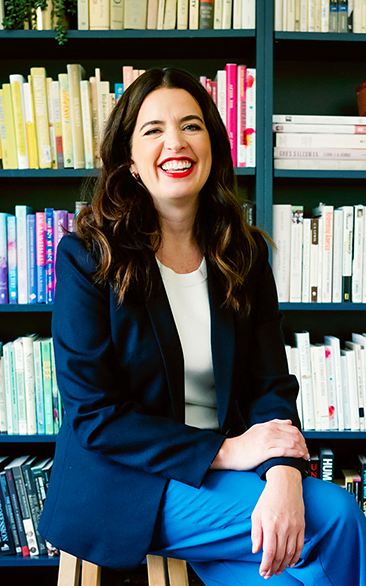


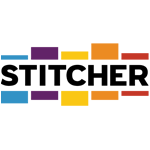





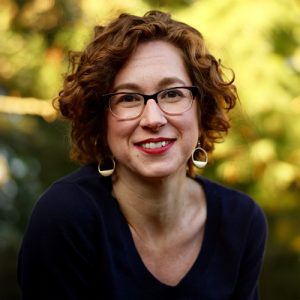

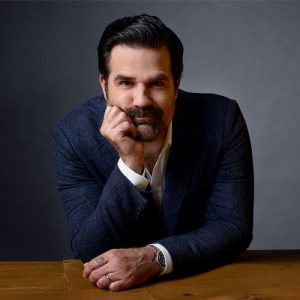
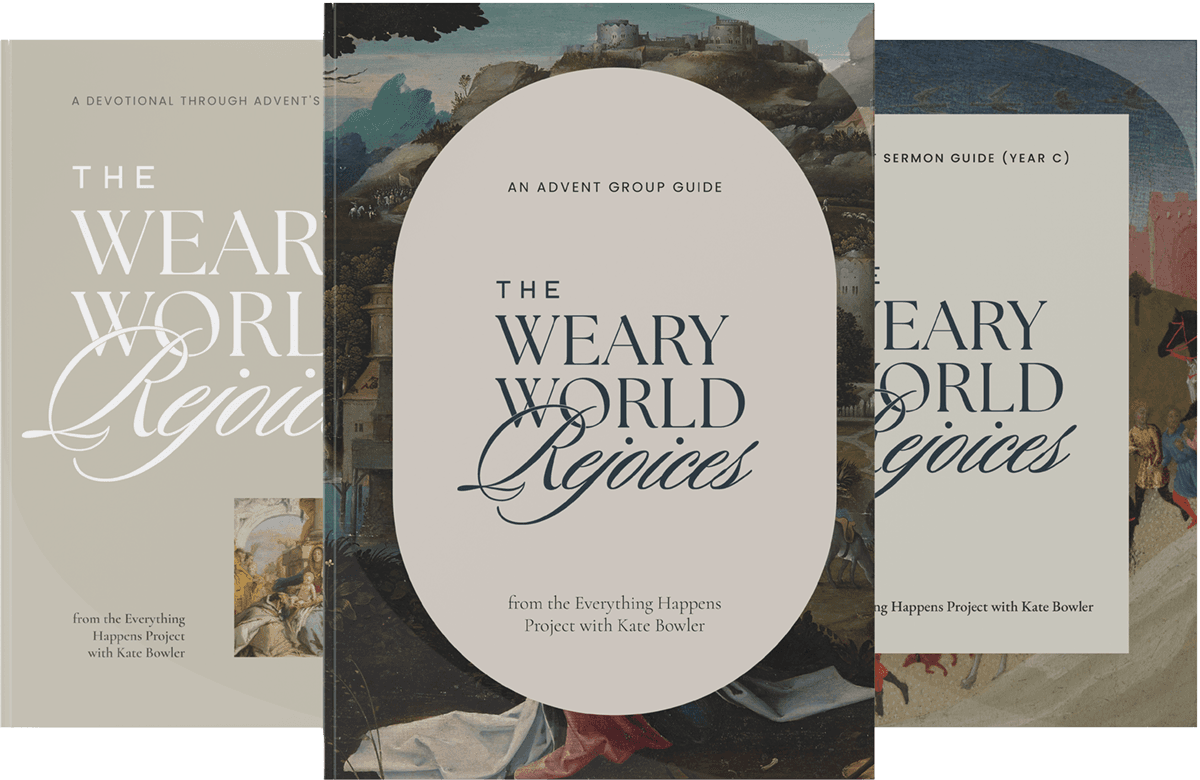
Leave a Reply